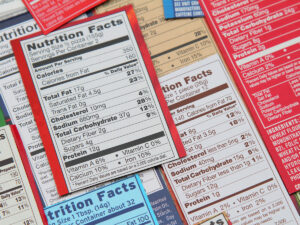

September marks Recovery Month, and while much discussion is centered on detox and behavioral health, what about nutrition and eating habits? They say that “food is medicine”, so how can building better nutritional habits help those in recovery?
Transfer Addictions and Addictive Eating
Bethany Say, RD, LDN, CDCES
Research shows that there is often a genetic link to addictions and substance use. Some people are at a higher risk to experience addictions whether they take the shape of substances, gambling, shopping, or eating. Here are some ideas to help those in recovery navigate a healthy relationship with food.
The Challenge: Stress
Those who seek out substances often do so as a way of coping with stress or trauma. When working on avoiding drugs or alcohol, it is common to experience what is called a “transfer addiction” or “cross-addiction”. This is what happens when a person goes from relying on one addictive habit to developing another addictive habit. For example, a person may quit using illegal drugs after a long hard day but pick up a bag of chips instead. In many of these cases, they are trading one unhealthy coping skill for another unhealthy coping skill.
The Solution: Building Positive Coping Skills
It is crucial that those seeking recovery also get support from a trained mental health therapist to help them through this very difficult time period. There they can work on building a positive social network and positive coping skills. This can include making a plan for what to do when emotions or stress runs high. This may also involve a process of working through past traumas and behaviors that fuel the addiction. One essential skill is to mindfully take a moment to check in with yourself prior to reaching for food to identify emotional state and physical hunger/lack of hunger before choosing to eat.The Challenge: Normalizing Eating
Weight gain can often be a positive result of a person working on recovery. Those who lean on smoking, drugs, or alcohol are at a higher risk for malnourishment and weight loss while they are using those substances. Once they enter recovery, appetite will likely ramp up and it will take time to get used to eating balanced meals consistently again. It may be difficult to gauge how much food is appropriate to eat during this time.
The Solution: Get Educated
Ask your doctor for a referral to a dietitian to help you determine the right meal plan to suit your needs. Use the online MyPlate and Eat Right resources available to the public for generalized guidance. Take the time to check into hunger and fullness before, during, and after eating to gauge how much food is right for you.
Challenge: Addictive Foods and American Food Culture
 There are three main food components that have been proven to have addictive qualities in the human brain: sugar, salt, and fat. Some people will experience a much stronger pleasure signal in the brain from eating these foods, as is the case with many people in recovery. This can make moderation of “junk” foods or processed foods difficult to achieve.
There are three main food components that have been proven to have addictive qualities in the human brain: sugar, salt, and fat. Some people will experience a much stronger pleasure signal in the brain from eating these foods, as is the case with many people in recovery. This can make moderation of “junk” foods or processed foods difficult to achieve.
The American food culture is full of highly processed foods that are chalk full of these 3 addictive food ingredients. We often see them filling the grocery stores and in advertisements for restaurants. These less healthful choices are often even more enticing because they are more convenient and taste good.
Examples of highly processed foods include:
- deli meats
- granola bars, crackers, chips, cookies, pastries, candies, instant noodles
- sodas and energy drinks
- most frozen foods, most cereals
Solution: Foods to Support Mental and Physical Health
Ample research has shown that choosing foods from more natural sources can help with a number of health conditions related to both physical and mental health. For example, eating more fruits, vegetables, and healthy fats has been proven to help alleviate anxiety and depression. These foods can also help stave off memory issues and cognitive decline. Choosing to eat a Mediterranean-style (see this Smart Nutrition wellness tip) or DASH-style diet has been shown to help with diabetes, high blood pressure, weight management, heart disease, and high cholesterol.
When you go to the grocery store, look for foods with less ingredients around the outer perimeter of the store. If it grows in nature, it’s probably good for you!
Examples of unprocessed and minimally processed foods:
- chicken, turkey, beef, pork loin, eggs, and fish (not breaded)
- all fresh produce and most frozen fruits and vegetables
- old fashioned oatmeal, brown rice, barley, quinoa, and 100% whole grain bread
- low sugar yogurt, cheese, and low fat cottage cheese
- beans and chickpeas
- unsalted/lightly salted nuts and seeds
Behavioral Changes and Replenishing Nutrients
Recovery can be a difficult time because it often requires people to confront a multitude of issues and radically change their lifestyle. Patients who go through drug and alcohol detox may also face a myriad of other health issues, addiction-related or not. In the Stepping Stones program at Meadville Medical Center, many other health conditions can be addressed for inpatients and outpatients in our hospital-based rehabilitation program. Coincidentally, September is also malnutrition month.
Nutrients to Support Active Recovery
Stefanie Arblaster, MHSc, RD, LDN
 Micronutrients, i.e., vitamins and minerals, serve a plethora of functions in the body, such as immune function, energy regulation and metabolism, bone health, blood clotting, and many more. Those in active substance abuse recovery have been shown to be deficient in many key vitamins and minerals, which can lead to malnutrition.
Micronutrients, i.e., vitamins and minerals, serve a plethora of functions in the body, such as immune function, energy regulation and metabolism, bone health, blood clotting, and many more. Those in active substance abuse recovery have been shown to be deficient in many key vitamins and minerals, which can lead to malnutrition.
Malnutrition can be caused by insufficient intakes of key nutrients, including calories. However, it may also be caused by poor nutrient absorption and metabolism. For example, those struggling with alcohol use disorder tend to experience reduced nutrient absorption due to alcohol’s effect on gastric motility (the digestive functions of the stomach) and damage to the cells in our small intestine that actually absorb these nutrients. Additionally, those with other substance abuse disorders may experience reduced oral intakes of these nutrients due to decreased appetite, lack of resources, and equipment to prepare nutrient dense options.
In order to support bodily functions to facilitate appropriate recovery and overall mental health, here are a few nutrients to help support one’s journey in recovery:
Folic acid (or vitamin B9)
Folic acid is essential for nervous system health and our blood cells. Folic acid is also essential in repairing oxidative damage and/or stress, which can be quite common among those recovering. Deficiency may cause conditions such as anemia, low energy levels, and mood changes.
Some food sources of folic acid include:
- fortified and enriched grains
- beets
- asparagus
- broccoli
- spinach and other dark leafy greens
Other B vitamins: B1, B2, B3, and B5
Our B vitamins play many essential roles in the body. Just to name a few, these include energy production and metabolism, heart health, neurotransmitter function (serotonin, dopamine, etc.), and hormone production.
Some food sources of these vitamins include:
- meat, poultry, pork, and fish
- milk and dairy products
- legumes (lentils, chickpeas)
- nuts and seeds
- fortified grains
Fat-soluble vitamins: A, D, E, & K
 Fat-soluble vitamins include vitamin A, D, E, and K. A key difference between these and water-soluble vitamins (think vitamin C or B) is that they require dietary fat to be absorbed appropriately, where water-soluble vitamins are directly absorbed into the blood steam.
Fat-soluble vitamins include vitamin A, D, E, and K. A key difference between these and water-soluble vitamins (think vitamin C or B) is that they require dietary fat to be absorbed appropriately, where water-soluble vitamins are directly absorbed into the blood steam.
These vitamins have many different roles in the body. Here are the main ways that these vitamins assist with both overall health and substance use recovery:
- Vitamin A
- Vitamin A helps with immune function and preventing illness, bone and cellular growth, and brain/cognitive function. Some food sources include sweet potato, carrots, spinach, and fortified skim milk.
- Vitamin D
- Vitamin D is responsible for the production of hormones, immune function/preventing illness, bone heath, energy levels. Some food sources include salmon, tuna, egg yolks, fortified milk and cereals. A non-food source includes the sun! Humans make a majority of our vitamin D from our skin being exposed to sunlight.
- Vitamin E
- Vitamin E is important for the prevention of blood clotting, protects against oxidative stress (antioxidant), brain health/cognitive function, and immune function/preventing illness. Some food sources include vegetable oil, nuts and seeds, leafy vegetables, and grains.
- Vitamin K
- Perhaps lesser known than the vitamins above, Vitamin K is essential for bone metabolism and blood clotting. Some food sources include leafy green vegetables, avocado, and nuts and seeds.
Magnesium
Magnesium is a mineral that aids with energy production, bone health, and acts as an antioxidant. Some different forms of magnesium supplementation may also help to promote healthy blood sugar levels, as well as improving sleep or reducing stress or anxiety. Always discuss with your physician and/or registered dietitian before starting any supplements.
Some sources of magnesium include:
- leafy greens
- nuts and seeds
- wheat or brown rice
Selenium
Selenium is an ultra-trace mineral, meaning that we only need a very small amount of it. Selenium aids with carbohydrate and fat metabolism, works as an antioxidant to fight oxidative stress, and also works with vitamin E to help protect red blood cells. It also assists with thyroid health.
Some food sources include:
- Brazil nuts
- shrimp, crab, lobster
- red meat
- wheat or brown rice
Additional Resources
- Other MMC Wellness Tips
- September is also fruits and veggies month! Try out some of the recipes from this previous wellness tip: Recipes to Try in Honor of Fruits and Veggies Month.
- There’s a lot to handle if you’re new to recovery and trying to work on better nutritional choices. Bethany Say offers some advice for quick and healthy meals in this wellness post: Tips for Quick and Healthy Meals.
- Recovery Month Blog Post
- Community is important in recovery. Learn why from: Recovery Starts When You Walk Out the Door: Why Community Is Your Lifeline.
- Related Services from MMC
- Behavioral Health
- Outpatient nutrition services
- Drug and alcohol treatment (inpatient and outpatient) through our Stepping Stones program


